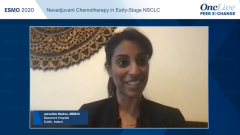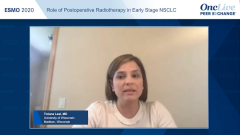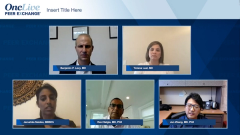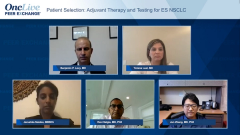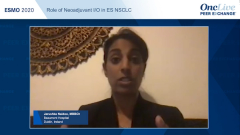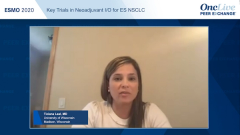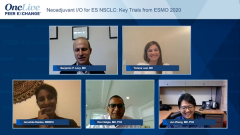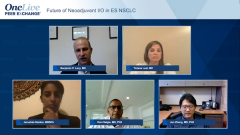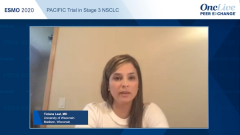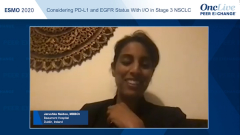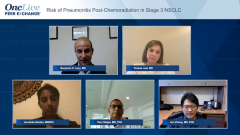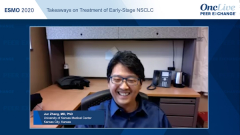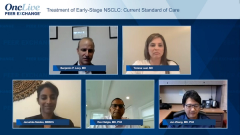
Patient Selection: Adjuvant Therapy and Testing for ES NSCLC
Episodes in this series

Benjamin P. Levy, MD: Who gets this, and for how long? Dr Leal, you’re not considering doing it yet, but let’s say you’ve decided that you’re going to give it routinely. Whom would you give it to, and for how long would you give the drug to them?
Ticiana Leal, MD: One of the things I want to add, in terms of adjuvant vs early metastatic, is that there are challenges with NGS [next-generation sequencing] testing. We’ll discuss this later on, but this is also something to look at. We know that the rates of NGS testing, even nowadays, across practices vary quite a bit. So yes, we could potentially use this at progression with metastatic disease. Are we treating patients who would never recur? Those are important considerations, and that’s why I’m cautious about giving it a bit more time. I want to see if we are going to see a bigger signal for which we’ll feel more comfortable exposing patients early to prolong therapy with potential adverse effects. Ultimately, they’re very well tolerated. But we do see a lot of adverse effects. I was actually quite impressed to see the data from a trial that was done with EGFR patients from a patient perspective. We can look at toxicity grading on clinical trials and look at higher-grade toxicity as how we report toxicities. But with patients who are young and are otherwise going back to work and trying to live their lives as normal as possible, you have to think about long-term toxicity, chronic low-grade toxicity, and how that affects their quality of life. So I do want to see some of that as well.
Whom would I give it to? I definitely think it is appropriate for the stage II/IIIA population. This is the population of higher risk of recurrence, in which we saw the most meaningful benefit. Regarding the duration of therapy, I would try to mirror what the study is doing.
Benjamin P. Levy, MD: Dr Zhang, what are your thoughts on this? Would you give it to a similar patient population? Are there people you wouldn’t give it to?
Jun Zhang, MD, PhD: Based on the study, stage II and III patients benefit the most. But the number also suggests, at least from the hazard ratio, that even stage IB patients get benefit as well. So these are patients for whom I also might consider this treatment if there’s another contraindication or if the patient is able to tolerate therapy.
Back to your question regarding whether we should start now or wait for the time when the patient develops metastatic disease, I would like to add that although there are probably not much clinical data, from a cancer biology perspective, if you let cancer continue to grow there will be clonal evolution. And yes, those patients develop metastatic cancer. They are more likely to respond to osimertinib. But at the same time, they may have some other concurrent mutations that might potentially affect the response from osimertinib. That is the reason why I would like to start to mirror the study.
Benjamin P. Levy, MD: How do we put this all together in terms of testing? We’re taught that we need to find these driver mutations in advanced-stage disease. If they have a particular genetic alteration, we want them to go on genotype-directed therapy. Now we have these data in the early stage setting that would suggest that mutations matter in terms of treatment decisions, adjuvantly. How do we put this together, in terms of testing? Should everyone be tested? All early stage patients? If so, how? Is it just EGFR, or is it all mutations? Dr Salgia, what are you guys thinking about doing, or what are you doing at City of Hope Comprehensive Cancer Center? What’s your take on this?
Ravi Salgia, MD, PhD: That’s an absolutely great question, and I have enjoyed the discussion. I strongly believe that we should test everyone. This is really important if it can help us make a clinical decision, if we can make a potential predictive value. As Dr Zhang said, are there any concomitant mutations? If you have EGFR with TP53 and RB, is that a negative predictor for osimertinib, as compared with EGFR mutations without any concomitant mutations? The second thing is, are there nongenetic mechanisms involved as well, such as EMT [epithelial-mesenchymal transitions]?
All those are important, from the perspective of having this predictive value. I’ve been in practice for over 30 years. I’m so excited that we’re seeing long-term survivors. We even have contemplated and are doing survivorship clinics for our patients. How great is that, right? So why not take advantage of all the information we can get and make the best clinical decision. Also, we have research behind the scenes and in front of the scenes too. Learn more so that we can add to the equation. I’m actually very excited about the DFS [disease-free survival] data, no question about it. But I do think we should do NGS testing on everyone.
Benjamin P. Levy, MD: Dr Leal, what are your thoughts on this?
Ticiana Leal, MD: I agree. I would echo those statements, and I really don’t have much to add. You said it very well, Dr Salgia. I definitely agree with testing everyone with NGS testing.
Benjamin P. Levy, MD: Dr Naidoo, give us your early experience in Ireland, in Europe. What’s being done there?
Jarushka Naidoo, MBBCh: Great question. I think doing NGS testing is the ideal approach. It provides information that you can save in your back pocket and can hopefully act on if needed in the future. In countries where we have a national health service and all this is not necessarily reimbursable by an individual payer, the discussion is a little different.
Certainly here, and in different places in Europe, there are standard panels that are done. The panel is usually completed, but the results are reported only for actionable alterations that are reimbursable therapeutic targets. Usually the data are there, but it’s going to be mined only if there’s something we can do about it.
I might disagree in some way, but I understand the thinking behind that. It doesn’t allow for the bit of the oncologic cookbook that can occur occasionally, where we see an alteration and might have a hunch or phase 1 or phase 2 data. It limits a bit of that and approaches things in a more standardized fashion.
Having said that, if I had my choice, I would get NGS testing done on everybody. I would like to know that information so I can inform my patient and myself.
Benjamin P. Levy, MD: Dr Zhang, what is your experience, and what you guys are doing?
Jun Zhang, MD, PhD: At this moment, we are not routinely doing an NGS panel for early stage lung cancer. However, I am personally in favor of it. There are a couple of reasons why. No. 1 is because of neoadjuvant immunotherapy. We know that for patients with EGFR mutations, for example, if they receive immunotherapy followed by osimertinib, they’ll be concerned with immune-mediated toxicity. It’s something that I would like to understand and try to avoid as well.
The second thing is, we don’t know whether other new immunotherapies—for example, other immune checkpoints—will have some value for this EGFR-mutant non–small cell lung cancer population, especially in the neoadjuvant setting. Having that piece of information will really answer this question. So yes, from my personal perspective, I would strongly recommend this approach.
Benjamin P. Levy, MD: This has been a great discussion. Before we move on, I’ve gotten some second-opinion consults recently. I have a patient of resected ALK lung cancer. Should I just be using alectinib or osimertinib for EGFR? What are people’s thoughts on that? Again, we have a high rate of relapse. We have a known drug with great activity. Is this where we stop and pause, or is there a role for adjuvant targeted therapies for other genotypes in the absence of data?
Jarushka Naidoo, MBBCh: I’ll take that. My answer is, show me the data. We can extrapolate in certain circumstances. But that is a very slippery slope, and I certainly wouldn’t advocate for that approach until we have data in the ALK population or the other groups.
Ravi Salgia, MD, PhD: What about ALCHEMIST? Enroll them in the ALCHEMIST trial then. Would that be ideal?
Benjamin P. Levy, MD: Yeah.
Ticiana Leal, MD: Yeah. This is an opportunity where we’re testing patients more commonly in the resected phase. We can boost accrual to trials like ALCHEMIST.
Benjamin P. Levy, MD: Yeah. And just to call for trials in this space, ctDNA [circulating tumor DNA] at some point may also be leveraged in the adjuvant space to understand monitoring for minimal residual disease. I look forward to seeing some of the data coming out, hopefully in the next year or 2, looking at ctDNA. Scans are scans. We think there are things going on underneath those scans that we could detect in plasma. I don’t know if you guys have experience with this? Dr Salgia?
Ravi Salgia, MD, PhD: Yeah. I love, Dr Levy, what your institution has done. There was a beautiful paper from Johns Hopkins and collaborative studies in terms of the science paper for screening for cancer, looking at it not only from blood biomarkers. I was very happy to see things such as CEA, CA 19-9, and CA 125 come back to fruition, in some sense. But then cell-free DNA as well, and PET scanning at the same time.
I’m always the biggest believer that you should use all the science and tools you must be able to arrive at an answer. We’re actually looking at ctDNA like there’s no tomorrow. No question about that. I hope we can get it approved through the payers—repeated ctDNA analysis. If somebody has a KRAS alteration and you give them a specific therapy, and then the KRAS goes away, that’s actually a very positive sign. But you have to do it in terms of clinical trials too, of course.
Transcript Edited for Clarity


